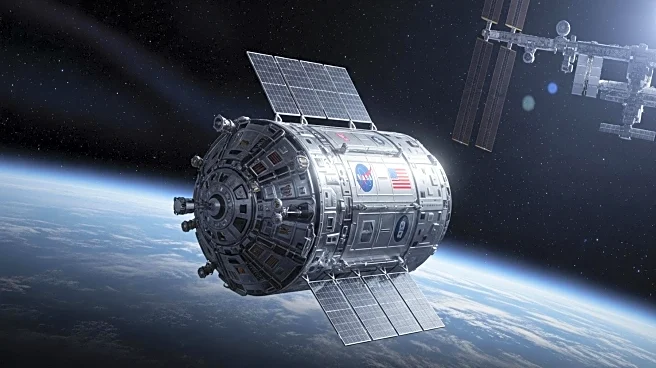What is the story about?
What's Happening?
NASA is coordinating two significant cargo missions to the International Space Station (ISS) to support the Expedition 73 crew. The Roscosmos Progress 93 cargo craft, launched on Thursday, is currently orbiting Earth and is scheduled to dock at the ISS on Saturday. It carries three tons of food, fuel, and supplies, and will remain docked for six months. Meanwhile, the Cygnus XL cargo craft from Northrop Grumman is set to launch on Sunday from Cape Canaveral Space Force Station, delivering over 11,000 pounds of science and supplies. NASA Flight Engineers Jonny Kim and Zena Cardman will oversee the arrival of Cygnus XL, utilizing the Canadarm2 robotic arm to capture the spacecraft. The crew is also engaged in various research activities, including cardiac and bone studies, and experiments involving sake yeast fermentation in space.
Why It's Important?
These resupply missions are crucial for maintaining the operational capabilities of the ISS and supporting ongoing scientific research. The delivery of essential supplies and new scientific equipment enables astronauts to continue experiments that could have significant implications for space travel and Earth-based applications. The research conducted aboard the ISS, such as the study of microgravity's effects on bone stem cells and fluid shifts in astronauts, contributes to our understanding of human health in space. Additionally, the brewing experiment using sake yeast could offer insights into fermentation processes in microgravity, potentially benefiting industries on Earth.
What's Next?
Following the docking of Progress 93, the crew will begin unpacking and utilizing the new supplies. The Cygnus XL mission will follow, with its capture scheduled for Wednesday. The successful completion of these missions will ensure the ISS remains well-stocked and equipped for future research endeavors. The ongoing experiments will continue to provide valuable data, potentially leading to advancements in space travel and technology. Stakeholders, including NASA and international partners, will monitor the outcomes of these missions to inform future resupply strategies and scientific priorities.
Beyond the Headlines
The dual cargo missions highlight the collaborative efforts between international space agencies, such as NASA and Roscosmos, in maintaining the ISS as a hub for scientific discovery. The research conducted aboard the station not only advances space exploration but also has the potential to drive innovation in various industries on Earth. The experiments on fermentation and fluid shifts could lead to new technologies and processes that enhance industrial applications and improve human health.
















